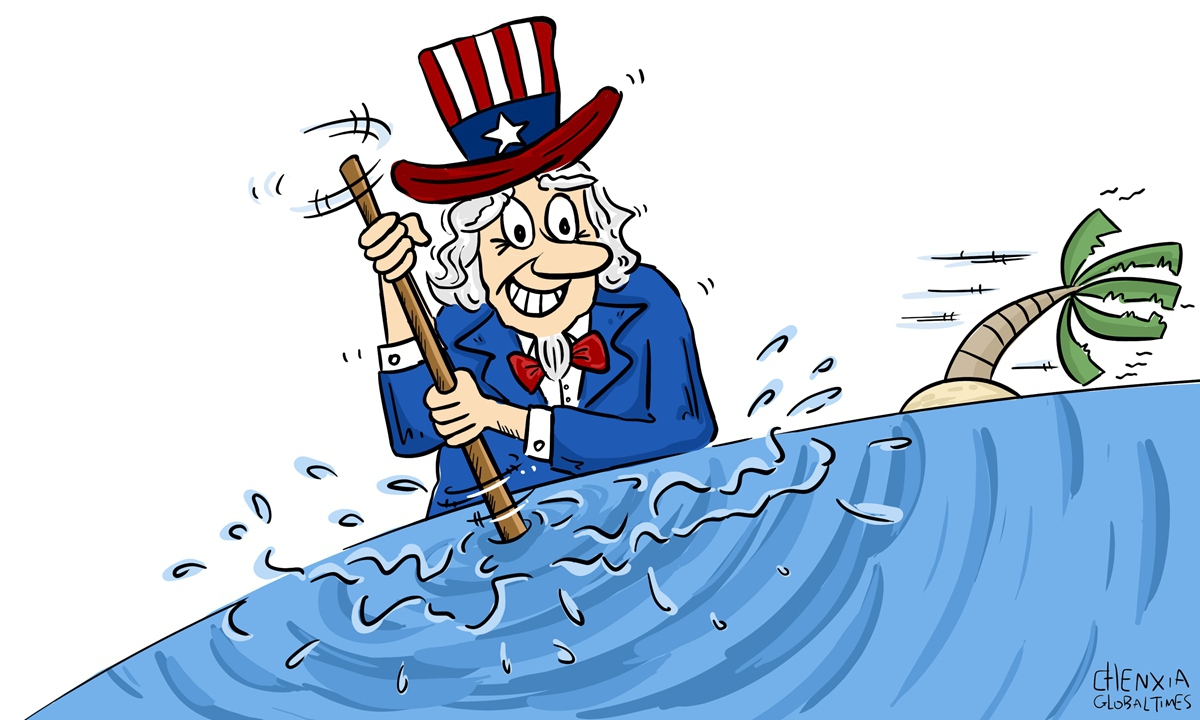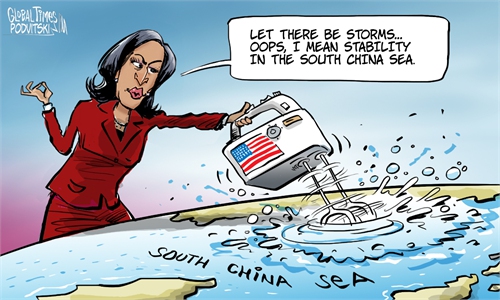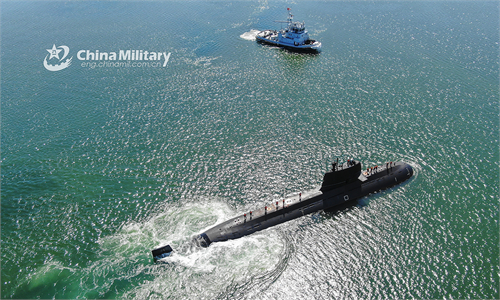
Illustration: Chen Xia/GT
Some US officials have sinister intentions - setting the tempo, manipulating situations and making wave in the South China Sea region - so that they can fish in these troubled waters and achieve their geopolitical goals.However, Washington's attempts to stir up trouble in the matter of the South China Sea won't succeed.
Bloomberg on Tuesday quoted the so-called Western officials as saying that China is building up several unoccupied land features in the South China Sea, saying it is "an unprecedented move" that they said was "part of Beijing's long-running effort to strengthen claims to disputed territory in a region critical to global trade." But the report did not identify who these officials are.
Such groundless reports are completely hyped by Washington, with evident intent of stirring up trouble. The US is aware that in some government agencies and media of the Philippines, there are some forces that are dissatisfied with China in the regard of the South China Sea issue. Washington may believe a little spark from the outside world would ignite strong anti-China sentiments, so as to drive a wedge between China and the Philippines.
In addition, as Philippine President Ferdinand Romualdez Marcos Jr. is scheduled to pay a state visit to China in early January, according to Philippine media reports, some Western allies of the US want to create obstacles for the continued development of China-Philippines friendship, and they are eager to see the South China Sea dispute become a permanent wound in China-Philippines relations and make the Philippines a bridgehead to contain China.
Bloomberg's report is not the sole recent case in which the US has sown discord between Beijing and Manila. A press statement released on Monday by US department of state said that Washington "supports the Philippines' continued calls upon the People's Republic of China (PRC) to respect the international law of the sea in the South China Sea, as reflected in the UN Convention on the Law of the Sea."
What's more, when in November US Vice President Kamala Harris visited Palawan, an island province of the Philippines which is close to China's Nansha Islands, she said Washington will stand by the Philippines in the face of intimidation and coercion in the South China Sea.
"It seems that this sequence of the US' provocative moves is well planned, that is, by taking advantage of Marcos newly taking office, Washington wants the Philippines to change what it sees as a 'pro-China' policy pursued during [former president Rodrigo] Duterte's tenure," Li Kaisheng, a research fellow and deputy director at the Institute of International Relations of the Shanghai Academy of Social Sciences, told the Global Times. "In the US' view, compared with Duterte, Marcos seems to be more flexible, which Washington sees as an opportunity. As a result, the US makes frequent provocations, with the ultimate goal of pushing the Philippines to the forefront of confrontation with China, rather than for the sake of the Philippines' interests."
By doing so, Washington hopes Manila to take sides with the US in its confrontation with China and hopes the South China Sea dispute to continue to burn as a persistent flashpoint, leaving room for the US to intervene.
According to Xu Liping, director of the Center for Southeast Asian Studies at the Chinese Academy of Social Sciences, the US' Indo-Pacific Strategy actually regards ASEAN as being a central position, and the South China Sea as its most important leverage. As a matter of fact, Washington exploits the South China Sea issue as an instrument to seek its geopolitical interests in the region.
Some Western media outlets also pay attention to Manila's responses to its recent frictions with Beijing. For example, last week, in response to the reported so-called swarming of Chinese vessels in a reef and shoal which Manila claims as its territory, Philippine acting defense secretary Jose Faustino said, "[President Marcos'] directive to the department is clear - we will not give up a single square inch of Philippine territory."
The rhetoric of "not giving up an inch of land" is actually a kind of politician's language, which is more out of domestic political considerations, attempting to gain more support from the public, and has little implication on diplomacy, noted experts.
Washington's provocation will provide the Philippines with some leverage in its exchanges with China, but Marcos will only exploit it as a tool, and Manila's pragmatic and balanced diplomacy will not change. The Philippines will not follow the path of confrontation with China, said Li. On the whole, US incitement will not fundamentally shake the overall friendship and cooperation between China and the Philippines as well as ASEAN.



